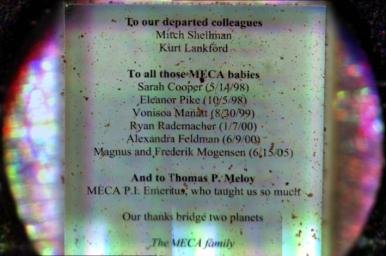
|
Mosaic of Commemorative Microscope Substrate
- Click the image above for a larger view
- Full-Res JPEG (1209 x 801) (100.7 kB)
- Full-Res TIFF (1209 x 801) (2.9 MB)
Caption:
Written by electron beam lithography in the Microdevices Laboratory of NASA's Jet Propulsion Laboratory, this Optical Microscope substrate helps the Phoenix Mars Mission science team learn how to assemble individual microscope images into a mosaic by aligning rows of text.
Each line is about 0.1 millimeter tall, the average thickness of a human hair. Except for the Mogensen twins, the names are of babies born and team members lost during the original development of MECA (the Microscopy, Electrochemistry and Conductivity Analyzer) for the canceled 2001 Mars lander mission. The plaque also acknowledges the MECA 2001 principal investigator, now retired.
This image was taken by the MECA Optical Microscope on Sol 111, or the 111th day of the Phoenix mission (Sept. 16, 2008).
Background Info:
The Phoenix Mission is led by the University of Arizona, Tucson, on behalf of NASA. Project management of the mission is by JPL, Pasadena, Calif. Spacecraft development was by Lockheed Martin Space Systems, Denver.
Photojournal Note: As planned, the Phoenix lander, which landed May 25, 2008 23:53 UTC, ended communications in November 2008, about six months after landing, when its solar panels ceased operating in the dark Martian winter.
Cataloging Keywords:
| Name | Value | Additional Values |
|---|---|---|
| Target | Mars | |
| System | ||
| Target Type | Planet | |
| Mission | Phoenix | |
| Instrument Host | Phoenix Lander | Phoenix Mars Lander |
| Host Type | Lander | |
| Instrument | Microscopy, Electrochemistry, and Conductivity Analyzer (MECA) | |
| Detector | ||
| Extra Keywords | Color | |
| Acquisition Date | ||
| Release Date | 2008-09-23 | |
| Date in Caption | ||
| Image Credit | NASA/JPL-Caltech | |
| Source | photojournal.jpl.nasa.gov/catalog/PIA11193 | |
| Identifier | PIA11193 | |
